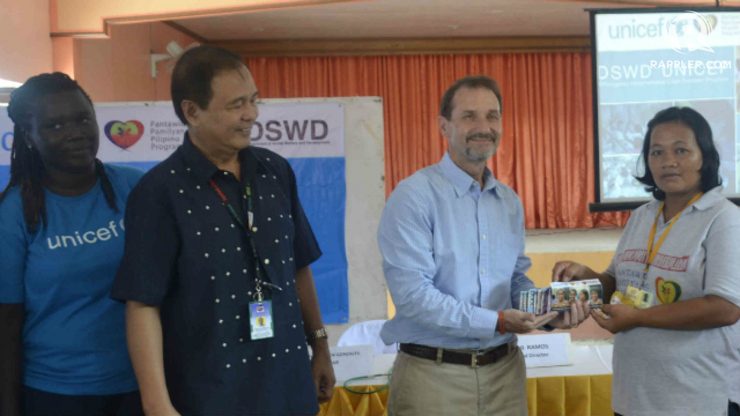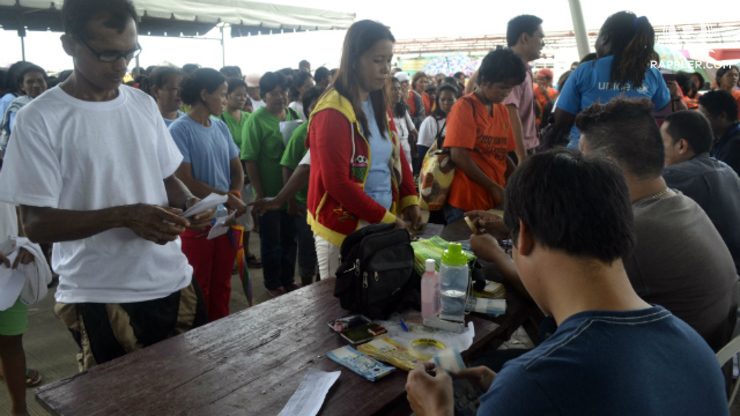SUMMARY
This is AI generated summarization, which may have errors. For context, always refer to the full article.

MANILA, Philippines – Residents in badly-hit areas in Eastern Samar struggle to recover the little they had that was taken away by the wrath of Typhoon Yolanda (Haiyan).
About 9 months after the typhoon killed more than 6,000 people and affected more than 3 million families, humanitarian organizations are slowly winding up their operations in the Visayas.
The Unconditional Cash Transfer (UCT) program of the Department of Social Welfare and Development (DSWD) and United Nations Children’s Fund (Unicef) aims to extend financial help to those affected by one of the strongest tropical cyclones ever recorded in recent history.
Rebuilding their lives
“Sobrang uncomparable ang devastation,” Guiuan mayor Christopher Gonzales said, recalling the aftermath of Yolanda. “Iyong 4Ps, nakatulong siya kasi nakita namin kung paano sila unti-unting naka-recover.” 4Ps refers to the Pantawid Pamilyang Pilipinong Program.
(The devastation was uncomparable. The 4Ps greatly helped and we were able to see how they were slowly able to recover.)
More than 5,800 families from the municipalities of Guiuan, Hernani, Mercedes, Balangkayan, and Salcedo under 4Ps will benefit from the emergency fund to rebuild their lives. These households were identified as unable to meet essential needs such as food and other services.
The beneficiaries will receive P4,400 each month until December, on top of the existing 4Ps cash pay-outs. The amount, based on their study, is enough to cover the basic necessities in households recovering from a disaster.
According to Charles Parks of Unicef, the recent typhoon pushed familes into deep poverty. Through financial assistance, the organization hopes to make families “step back from the negative decisions” that lead to damaged lives of children.
“These situations often result in negative outcomes to children such as malnutrition,” he explained.
Almost 84,000 children suffered from malnutrition after the typhoon. While the regular sources of food such as the fields and trees were destroyed by flooding and strong winds, relief goods often do not satisfy the nutritional needs of the victims. (READ: Proper nutrition during disasters: Is it possible?)
Unlike the existing Conditional Cash Transfer (CCT) Program, the UCT does not set any other guidelines as long as the family is enrolled under 4Ps.

Money matters
When an emergency happens, development takes a back seat. Post-disaster recovery period also requires diverse needs for different families.
Cash, according to Unicef, is the best way to address these diverse needs if targetting is done right.
Studies by the organization show that family beneficiaries spend 50% of received money on food, while the other half is spent on education, health care, and other basic services.
39-year-old Grace Rapada has been enrolled in the 4Ps program for almost two years already. She and her family lost everything to Typhoon Yolanda.
Although still struggling to forget how that fateful morning in November changed their lives, Grace looks forward to recovering all they lost – including rebuilding the future of her 8 children. She hopes to use the money for her children’s education and health needs.
“Lahat nawala sa amin noong araw na iyon,” she recalled. “Nagpasalamat na lang kami na buhay kaming lahat.” (We lost everything that day. We’re just grateful that we’re still alive.)
The financial assistance may also extend to people beyond the beneficiary family in other forms, DSWD Assistant Secretary Teodulo Romo Jr said.
“Those who directly benefit from this will also help those who do not,” he explained. “Iyong mga nagtitinda, mga kamag-anak nila, lahat.”
(Those who directly benefit from this will also help those who do not. Those selling were all relatives of theirs.)
Future expansion
The 5 municipalities of Eastern Samar are under the initial coverage of the program. The Unicef and the DSWD are looking into making the UCT permanent in case of disasters.
It is also the first time a kind of cash transfer with no conditions is being done in the country.
“This is just a test if things will work out greatly,” Augusto Rodriguez of Unicef said. “We want to institutionalize this program with the help of DSWD,” he added. – Rappler.com
Add a comment
How does this make you feel?
There are no comments yet. Add your comment to start the conversation.